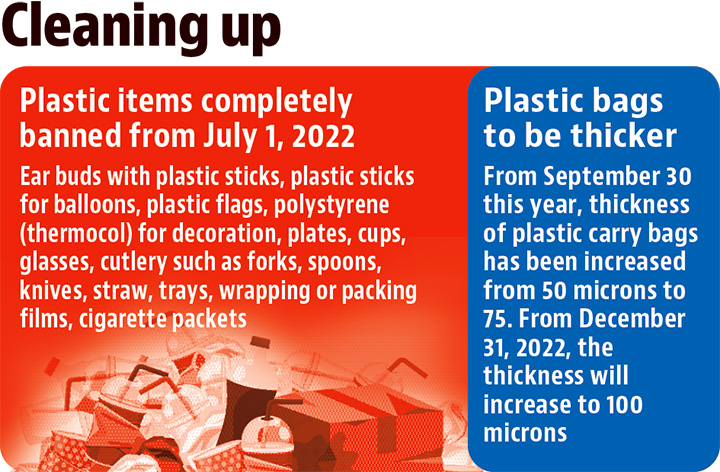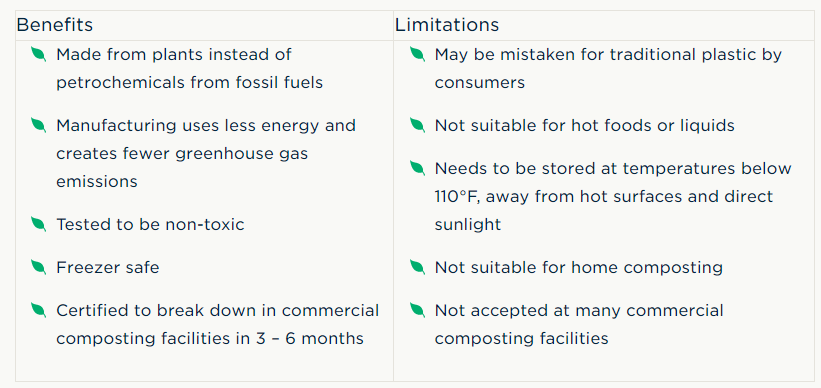Biodiversity & Environment
Ban on Single-Use Plastic
- 14 Aug 2021
- 6 min read
Why in News
Recently, the Ministry Of Environment Forest And Climate Change has notified the Plastic Waste Management Amendment Rules, 2021.
- These rules prohibit specific single-use plastic items which have “low utility and high littering potential” by 2022.
Key Points
- About:
- New Rules:
- The manufacture, import, stocking, distribution, sale and use of the identified single-use plastic will be prohibited with effect from the 1st July, 2022.
- The ban will not apply to commodities made of compostable plastic.
- For banning other plastic commodities in the future, other than those that have been listed in this notification, the government has given industry ten years from the date of notification for compliance.
- The permitted thickness of the plastic bags, currently 50 microns, will be increased to 75 microns from 30th September, 2021, and to 120 microns from the 31st December, 2022.
- Plastic bags with higher thickness are more easily handled as waste and have higher recyclability.
- Legal Framework for Banning Plastic: Currently, the Plastic Waste Management Rules, 2016, prohibits manufacture, import, stocking, distribution, sale and use of carry bags and plastic sheets less than 50 microns in thickness in the country.
- Plastic Waste Management Amendment Rules, 2021 amend the 2016 rules.
- Implementing Agency: The Central Pollution Control Board, along with state pollution bodies, will monitor the ban, identify violations, and impose penalties already prescribed under the Environmental Protection Act, 1986.
- New Rules:
- Compostable Plastics:
- Instead of using plastic made from petrochemicals and fossil fuels, compostable plastics are derived from renewable materials like corn, potato, and tapioca starches, cellulose, soy protein, and lactic acid.
- These are non-toxic and decompose back into carbon dioxide, water, and biomass when composted.
- Single Use Plastics and Reasons for the Ban:
- Single-use plastics, or disposable plastics, are used only once before they are thrown away or recycled.
- Plastic is so cheap and convenient that it has replaced all other materials from the packaging industry but it takes hundreds of years to disintegrate.
- If we look at the data, out of 9.46 million tonnes of plastic waste generated every year in our country, 43% is single use plastic.
- Further, Petroleum-based plastic is non biodegradable and usually goes into a landfill where it is buried or it gets into the water and finds its way into the ocean.
- In the process of breaking down, it releases toxic chemicals (additives that were used to shape and harden the plastic) which make their way into our food and water supply.
- Pollution due to single use plastic items has become an important environmental challenge confronting all countries and India is committed to take action for mitigation of pollution caused by littered Single Use Plastics.
- At the 4th United Nations Environment Assembly in 2019, India piloted a resolution on addressing single-use plastic products pollution.
- The Prime Minister of India was also conferred the “champions of the earth” award by the United Nations Environment Programme (UNEP) in 2018 for pledging to eliminate all single-use plastic by 2022.
Initiatives to Curb Plastic Waste
Way Forward
- Sustainable Alternatives: Economically affordable and ecologically viable alternatives which will not burden the resources needed and their prices will also come down with time and increase in demand.
- Need to promote alternatives like cotton, khadi bags and biodegradable plastics.
- More R&D (Research & Development) and finances for it, are needed to look for sustainably viable options.
- Circular Economy: Countries must embrace circular and sustainable economic practices throughout the plastics value chain to reduce plastic pollution.
- A circular economy depends on reuse, sharing, repair, refurbishment, remanufacturing and recycling of resources to create a closed-loop system, minimising the use of resources, generation of waste, pollution and carbon emissions.
- Behavioural Change: Citizens have to bring behavioural change and contribute by not littering and helping in waste segregation and waste management.
- Extended Producer Responsibility: At the policy level, the concept of Extended Producer Responsibility (EPR), already mentioned under the 2016 Rules, has to be promoted.
- EPR is a policy approach under which producers are given a significant responsibility – financial and/or physical – for the treatment or disposal of post-consumer products.






